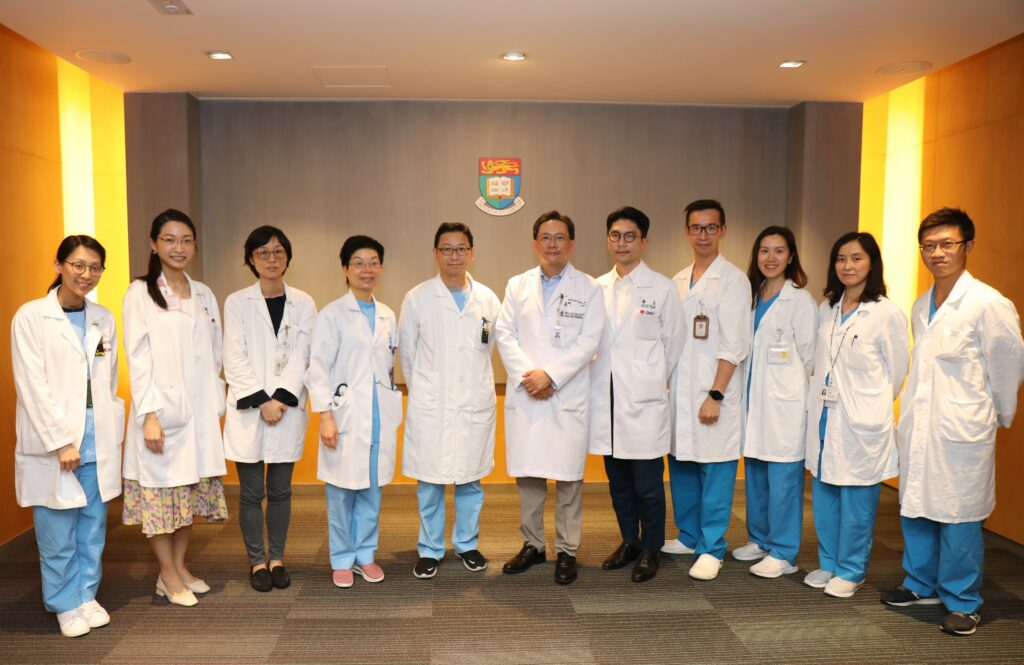
本專案外科學系、臨床腫瘤學系與病理學系團隊成員
- Project Details:
| Project Code: | T12-701/17-R |
| Project Title: | Translational Studies for Elucidating the Tumor Heterogeneity and Molecular Evolution in Metastatic Gastrointestinal Tract Cancers for Personalized Medicine |
| Project Coordinator: | Professor Maria Li LUNG (Nov 2017-June 2022) Professor Simon Ying-kit LAW (July 2022-Oct 2022) |
| Coordinating Institution: | The University of Hong Kong |
| Participating Institution(s): | National University of Singapore Griffith University of Australia |
- Abstract
| Esophageal cancers are deadly cancers due to late diagnosis. We aimed to identify and characterize molecular alterations and mutations associated with tumor metastasis to understand disease mechanisms and identify useful markers to improve diagnosis. CTCs from primary and metastatic tumors are shed into the blood stream and allow non-invasive real-time detection of cancers. We aimed to determine the usefulness of CTCs to understand tumor heterogeneity, identify useful markers hallmarking metastasis, patient stratification, and actionable targets for improved treatment, and to identify important immune and stromal contributors to cancer. Retrospective and serial analysis of ESC patients undergoing treatment was performed to identify predictive markers associated with treatment outcomes. We aimed to identify genetic alterations in metastatic tumors of known good/poor chemoradiotherapy (CRT) responders from archived ESC patient tissues, as predictive biomarkers for patient stratification and improved guidance of treatment options. We determined the clinical utility of liquid biopsies for non-invasive real-time monitoring for metastasis and drug resistance for GIT cancers to expand treatment choices for precision medicine. We established a bank of organoid tissues directly from tumor tissues to establish animal models to evaluate drug efficacy. |
- Research Impact
| • Identification of useful biomarkers for patient prognostication using serial blood testing at different timepoints of patient treatment by ctDNA and CTC analysis and from whole genome sequencing of primary and nodal metastatic tumors to identify potential biomarkers for highrisk ESC patients with expected poor treatment outcomes. • Establishment of a bank of organoids and patient-derived xenografts for evaluation of useful drugs and development of animal models. • Assessment of dual cancers spatial inter- or intra-tumor heterogeneity. NGS data provided important implications for prognostication. Findings support multicentric independent clonal evolution and the theory of field cancerization, implicating an etiologic role of alcohol metabolism in dual ESC/hypo pharyngeal carcinoma (HPC) carcinogenesis. • scRNA Seq elucidated the complex immunosuppressive interactions of various stromal cell types and the epithelial tumors in the ESC tumor microenvironment and identified potential prognostic cancer cell transcriptomic signatures. • Whole-exome sequencing ( WGS ) data analysis allowed the discovery of the importance of genomic instability and in nodal metastases in ESC, a s potential biomarkers to identify the high-risk esophageal squamous cell carcinoma (ESCC) patients with early death posttreatment. • Analysis of the good and poor responders by comprehensive genomic profiling of FormalinFixed Paraffin-Embedded (FFPE) tissues from patients receiving neoadjuvant CRT identified potential biomarkers associated with relapse and death. |
